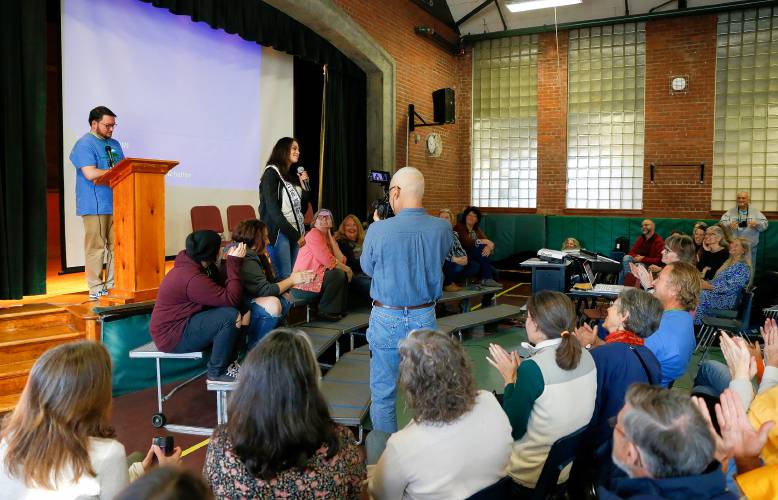Heightened generational and cultural divides are increasingly apparent throughout Appalachia as rural students navigate the path to higher education. College has shifted from presenting a lure of opportunity to one of uncertainty and risk.
To tell community members in a small Appalachian town to pull themselves up by their bootstraps economically in an age when manual labor is becoming less and less crucial is to acknowledge that “good jobs” are disappearing—and often require a college degree. Meanwhile insisting college is the only path to economic opportunity runs the risk of invalidating the experience of generations of families working honest jobs back home.
Families face conflicting choices at the end of high school; Do we encourage our kids to stay, to help out however they can the way we have for generations — or do we send them away to learn new skills, running the risk they might not have a home to return to?
It’s not a matter of will. Rural high school students as a whole actually score better on the National Assessment of Educational Progress than their urban counterparts, and graduate from high school at a higher percentage than the national average, the U.S. Department of Education reports. Nonetheless, many high schools in ARC-designated economically distressed counties go to college at rates between 20 to 40 percent. That’s significantly lower than the 50 percent college-going rates that rural students as a whole hold nationwide, a figure that scores even lower still than the 60 percent rate of students across the U.S. as a whole.
Regardless, when low-income, first-generation college-going families can’t afford to send their kids far away, precarious financial situations can set families back more than they’re prepared to handle. As a result, many families don’t see college as an option. For those that do, college attendance still comes with a slew of social and economic problems.
Some government initiatives have been put in place to help students out of poverty. But what happens when going off to college actually complicates their personal, familial and community lives?
Franklin, a town in Eastern West Virginia with a population under 700, has one stoplight.
Neither of Jared Lathrop’s parents went to college. Of his 11 cousins, only he and his sister took the university route. Of those two, in line with her childhood dreams, his sister got married soon after leaving home, moved back to Franklin and got to work building a family.
Jared is still working on his third degree.
Starting even in middle school, Lathrop said his mother would remind him when he would struggle with homework, “You’ve got to get out of here, you’ve got to go to college, you’ve got to make something of yourself because I want the best for you.”
When he graduated high school in 2007, he immediately enrolled in West Virginia University’s journalism undergraduate program.
“Since I left Franklin almost 10 years ago, there has been a constant fear of failure that I have had for myself,” he said. “Not from anybody putting it on me, but the idea that I would fail at my job, or fail at grad school, and have to go home.”
He said throughout his life, his mother told him that if he didn’t get to college, he wouldn’t get to leave home.
But now, he doesn’t feel like he can come home just yet, even though he wants to.
“My family has told me to come home and reset, but all I could think of was failure,” he said. “Not because I don’t love my hometown, but because the job prospects are so low there that it just felt like rock bottom in a way.”
In 9th grade, Lathrop’s class unofficially divided itself into those who decided they were going to college, and those who were not. A large swath of his class wanted to work on the farms that they grew up on, Lathrop said. Teachers doled out available resources to those “chosen few” amongst the college-ready group: the ones with the grades, family background and financial security to actually follow through on the promise of college.
In 7th grade, he was connected with a program through Shepherd University (then-College) called Gateway, that provided him with the chance to see what a college campus was like. In high school, he was selected to receive aid through the U.S. Department of Education’s Upward Bound, which provides resources to first-generation college students based on financial need.
These kinds of programs aid students like these the most; those who just need an extra push towards their FAFSA application or one more school tour to solidify their future career trajectory.
Two-and-a-half degrees into her own education, Robin Nelson found herself making minimum wage at a hospital in Morgantown, West Virginia.
She too had been told throughout life to go to college as a chance to bring her family out of poverty; but nobody told her what to study, a lack of guidance she regrets to this day.
“You have to college, you have to college,” family and teachers said, “but what they should have said is ‘you have to get a degree in an industry that needs you,’” said Nelson.
“They sort of picked us,” she said about her high school experience. She was selected as a WVU McNair Scholar for her undergraduate studies at WVU, which is federally funded through the Department of Education to serve first-generation and income-eligible students. Nelson received extra attention from her guidance counselor in high school to be connected with the program.
“I was one of the ‘smarter kids,’ so I took more science and math,” she said of her high school preparations for college. “The others took vocational classes. All of those kids are now electricians and plumbers, coal miners. Those people make good money. I wish that’s what I could have done.”
In 2009, after an extra year in undergrad, she was awarded a double-bachelor’s’ degree in Criminology and Women’s Studies. Unsatisfied with her options, Nelson said she literally Googled “master’s degree, return on investment” to come to the idea of an MBA, despite the fact that she had never taken a business class in her life. Although she felt like she had to study twice as hard as her peers, she graduated with a 3.9 GPA, at the top of her class at WVU.
Now her minimum wage job comes with $55,000 in debt.
Her parents never helped with her tuition, insisting that the decision to leave was her choice, but they still expect her to move back to their thousand-person town of Marlinton, West Virginia.
At age 32, Nelson works now as a secretary at the university, but is actively seeking a position that uses her business degree. If she doesn’t find something soon, she’s determined to get her Ph.D, which she believes will afford her more selection in her career.
Nelson said that her current employer chose her because she was the most well-educated person to apply; they were surprised she took it.
The first weekend he came home during his freshman year, Lathrop ran into a fellow student from his class for the first time since leaving mere months prior.
“And he said ‘Oh look, it’s that kid who graduated and went off to college, he thinks he’s fancy now,’” Lathrop said. “And nothing had changed between us, and it was said in passing, but the impression was that he thought I was better than him. Income-based, we are the same.”
Away from home, Lathrop said the transition to campus life during his freshman year was one of the most eye-opening experiences.
“Morgantown isn’t the most ginormous city in America, but coming from a town of 700 people where we have one stoplight in the county, to sitting in a lecture hall with 300 students — it was almost a reinvention period of ‘who am I, who do I want to be, am I good enough?’” he said.
He was put on a floor with one person from high school, and 48 other students from places like New Jersey and New York, and heard about their experiences of growing up with 2,000 students.
“Meanwhile I can still name every single one of my classmates who I graduated with,” he said.
It gave him a weird sense of homesickness: rejected at school because of where he was from, but not allowed to return home without something to show for leaving. “Am I good enough for an education, or do I belong back home with everybody else?”
Lathrop didn’t go to his high school reunion this year. But he did go to a diner the last time he was home, the same one he always goes to, with the same waitresses who have worked there since he first ate there in high school. They ask what he’s up to lately, and when he talks about his academics, they say it “sounds like a lot,” and leave it at that.
State-level programs like those that Lathrop and Nelson used to help ease the financial burden put on families and encourage their children to get, and finish, college degrees are threatened under recent proposed budget cuts.
The Appalachian Regional Commission defaults to the findings of a study completed in the 1990’s that found major discrepancies between the Appalachian region of Ohio and the rest of the state in terms of college attendance and achievement. Parents who took part noted that the entire process of selecting a college, applying to the school and for financial assistance, and making the transition from high school to college was too complex to complete without outside assistance–especially for those who lacked the personal experience of this process themselves.
But part of the problem is that of majority cultural sentiment. As a whole, fewer rural white men are convinced than their suburban and urban counterparts that colleges and universities have a role in providing necessary skills, according to the Pew Research Center. And that’s not for nothing. The connection between educational attainment and economic development is becoming less and less relevant as automation puts many manual-labor jobs out of business in Appalachia.
Franklin has always been somewhat of a ghost town, he said, with most businesses closed by 8 p.m., and closed on weekends. Now, the community leaders who were in their 50’s and 60’s when he was there are dying off. There are dwindling resources for his high school classmates who stayed, limited job opportunities, and staple businesses shutting down.
Those who left Appalachia for school, with every intention to come back — Lathrop and Nelson both included — are finding fewer reasons to return.
While there are arguments to be made for increased attention on getting rural students to college, more focus must be placed on following these students through into the workforce. As the urban/rural divide has worsened over the years, the benefit of long-term, systemic aid has been recognized as a more sustainable method of maintaining a local workforce than simple in-school resources.
“In a small town this really isn’t the norm,” Nelson said of her own student debt. “People get married and stay there, and get on welfare…or whatever.”
Lovey Cooper (@loveycooper) is a contributing editor with 100 Days in Appalachia, and reports on the intersection of politics and culture. Her work appears in The Atlantic, Vice, Rewire News and Education Week.



